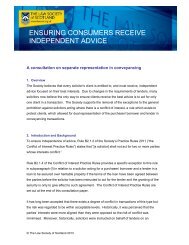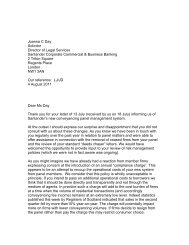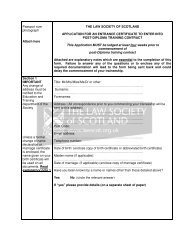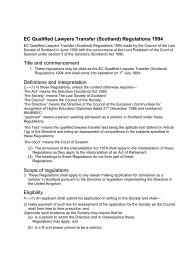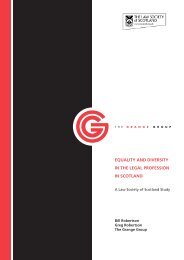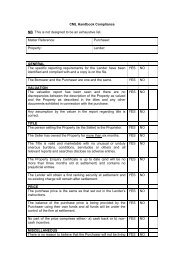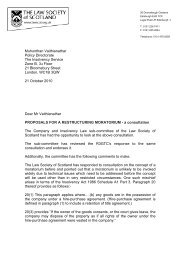Pre-diploma Training - Law Society of Scotland
Pre-diploma Training - Law Society of Scotland
Pre-diploma Training - Law Society of Scotland
You also want an ePaper? Increase the reach of your titles
YUMPU automatically turns print PDFs into web optimized ePapers that Google loves.
www.lawscot.org.uk<br />
4<br />
<strong>Pre</strong>-<strong>diploma</strong><br />
<strong>Training</strong><br />
SHND in Legal Studies from a<br />
College <strong>of</strong> Further Education<br />
approved by the Council <strong>of</strong> the<br />
<strong>Law</strong> <strong>Society</strong> is acceptable,<br />
provided that the applicant also<br />
holds a pass in English at<br />
Higher grade at not less than B<br />
standard or its equivalent.<br />
2. Other Intrants<br />
The entrance qualifications<br />
listed above may be relaxed for<br />
Intrants will also be entitled to<br />
enter pre-Diploma training if<br />
they are:-<br />
(i) graduates in a discipline<br />
other than law; or<br />
(ii) members <strong>of</strong> the Institute <strong>of</strong><br />
Chartered Accountants <strong>of</strong><br />
<strong>Scotland</strong>, or the Institute <strong>of</strong><br />
Chartered Accountants <strong>of</strong><br />
England and Wales, or the<br />
Association <strong>of</strong> Certified and<br />
Corporate Accountants; or<br />
(iii) commissioned <strong>of</strong>ficers in<br />
*These subjects are examined<br />
as part <strong>of</strong> the Diploma in Legal<br />
Practice course and it is<br />
therefore not necessary to<br />
obtain passes in them prior to<br />
admission to the Diploma.<br />
†A pass in European<br />
Community <strong>Law</strong> is required<br />
prior to admission as a solicitor,<br />
but can be obtained during<br />
post-Diploma training.<br />
Notes<br />
1. The examinations should be<br />
passed within four years <strong>of</strong> the<br />
date on which the candidate<br />
first presents him/herself for<br />
examination.<br />
week <strong>of</strong> June and the first week<br />
<strong>of</strong> September.<br />
3. We would advise that, other<br />
than in exceptional<br />
circumstances, a candidate<br />
does not attempt more than<br />
two examinations at any one<br />
diet.<br />
4. The examination syllabus<br />
and reading list are available<br />
on our website. Past papers<br />
can be obtained at a small<br />
charge from the Legal<br />
Education Department <strong>of</strong> the<br />
<strong>Law</strong> <strong>Society</strong> <strong>of</strong> <strong>Scotland</strong>.<br />
www.lawscot.org.uk<br />
4<br />
applicants with existing<br />
experience <strong>of</strong> legal work and<br />
evidence <strong>of</strong> some academic<br />
attainment.<br />
the armed forces, where<br />
commission follows study<br />
at a Royal Navy, Army or<br />
Royal Air Force College.<br />
2. The <strong>Law</strong> <strong>Society</strong> <strong>of</strong> <strong>Scotland</strong><br />
holds two diets <strong>of</strong> examinations<br />
each year, usually in the first<br />
5. The <strong>Law</strong> <strong>Society</strong> does not<br />
provide formal tuition for the<br />
examinations.<br />
appendix 2<br />
THE INFORMATION IN THIS LEAFLET IS ALSO AVAILABLE IN<br />
<strong>Law</strong> <strong>Society</strong> Examinations<br />
LARGER PRINT FROM THE LAW SOCIETY IF REQUIRED.<br />
Public <strong>Law</strong> and the Legal<br />
System<br />
Evidence<br />
Taxation<br />
The <strong>Law</strong> <strong>Society</strong> <strong>of</strong> <strong>Scotland</strong><br />
Scots Private <strong>Law</strong><br />
Scots Criminal <strong>Law</strong><br />
Scots Commercial <strong>Law</strong><br />
Conveyancing<br />
Accounting*<br />
Procedure*<br />
Pr<strong>of</strong>essional Responsibility*<br />
European Community <strong>Law</strong>†<br />
26 Drumsheugh Gardens, Edinburgh EH3 7YR<br />
Telephone: 0131 476 8126/55<br />
Facsimile: 0131 476 8109<br />
Email: legaleduc@lawscot.org.uk<br />
Minicom: 0131 476 8359<br />
The <strong>Law</strong> <strong>Society</strong> <strong>of</strong> <strong>Scotland</strong>
a law degree<br />
is now the<br />
accepted<br />
means <strong>of</strong><br />
entering the<br />
legal<br />
pr<strong>of</strong>ession<br />
4<br />
pre-<strong>diploma</strong><br />
training<br />
A law degree is now the<br />
accepted means <strong>of</strong> entering<br />
the legal pr<strong>of</strong>ession. However, it<br />
may not be possible for all<br />
intending lawyers to spend<br />
three or four years at university.<br />
As an alternative, it is possible<br />
to qualify for the solicitor<br />
branch <strong>of</strong> the legal pr<strong>of</strong>ession<br />
by a combination <strong>of</strong> the <strong>Law</strong><br />
<strong>Society</strong>’s own examinations<br />
and the Diploma in Legal<br />
Practice.<br />
In order to be eligible to sit the<br />
<strong>Law</strong> <strong>Society</strong>’s examinations, a<br />
candidate must find full time<br />
employment as a pre-Diploma<br />
trainee with a qualified solicitor<br />
practising in <strong>Scotland</strong>. A pre-<br />
Diploma training contract lasts<br />
for three years and during that<br />
time the trainee must receive<br />
training in the three prescribed<br />
areas <strong>of</strong> conveyancing,<br />
litigation, and either trusts and<br />
executries or the legal work <strong>of</strong> a<br />
public authority. To be eligible<br />
to enter into a pre-Diploma<br />
training contract, an applicant<br />
must fulfil certain educational<br />
requirements as outlined in<br />
Appendix 1.<br />
During the period <strong>of</strong> the training<br />
contract, the trainee will study<br />
for the <strong>Law</strong> <strong>Society</strong>’s<br />
examinations, <strong>of</strong> which seven<br />
must be passed before<br />
proceeding to the Diploma in<br />
Legal Practice. A good<br />
examination record is important<br />
as it is taken into account by<br />
the universities when<br />
considering applications for<br />
places on the Diploma in Legal<br />
Practice. Details <strong>of</strong> the<br />
examinations appear in<br />
Appendix 2.<br />
Many <strong>of</strong> those who qualify in<br />
this way already work in<br />
solicitors’ firms in various<br />
capacities. Candidates who are<br />
not already employed by a firm<br />
<strong>of</strong> solicitors may experience<br />
difficulty in finding an employer<br />
willing to take them on under a<br />
pre-Diploma training contract. It<br />
may be worthwhile making a<br />
direct approach to local firms <strong>of</strong><br />
solicitors or to firms with whom<br />
you already have an existing<br />
connection. Very few employers<br />
in the public sector engage<br />
pre-Diploma trainees.<br />
On completing the three year<br />
pre-Diploma training contract<br />
and passing the examinations,<br />
the route to qualification<br />
merges with that <strong>of</strong> law<br />
graduates as all intending<br />
solicitors are required to obtain<br />
the Diploma in Legal Practice<br />
and undertake a two year post-<br />
Diploma training.<br />
This route to qualification<br />
cannot be regarded as an easy<br />
option; strong motivation is<br />
required. You will be embarking<br />
on three years <strong>of</strong> full time<br />
employment combined with self<br />
study in your own time for<br />
demanding examinations.<br />
appendix 1<br />
Entrance Qualifications<br />
1. Non-graduate<br />
Intrants<br />
Passes in five subjects, with a<br />
total <strong>of</strong> not less than 6 points in<br />
SCE Highers, and ‘O’ grades or<br />
Standard grades at C standard<br />
or above. (SCE Higher at A<br />
standard = 3 points, B<br />
standard = 2 points and C<br />
standard = 1 point. GCE<br />
Advanced level at A standard<br />
= 4 points, B standard = 3<br />
points, C standard = 2 points,<br />
D standard = 1 point).<br />
In addition, there is the<br />
disadvantage <strong>of</strong> not acquiring a<br />
<strong>Law</strong> Degree which is a useful<br />
qualification in itself for<br />
purposes other than qualifying<br />
as a solicitor.<br />
As mentioned, many <strong>of</strong> those<br />
undertaking this type <strong>of</strong> training<br />
have already worked in<br />
solicitors’ <strong>of</strong>fices and may<br />
therefore have a clear picture <strong>of</strong><br />
the kind <strong>of</strong> work which interests<br />
them. They will also have an<br />
idea <strong>of</strong> the commitment<br />
involved. Candidates who<br />
qualify by this route <strong>of</strong>ten make<br />
very good solicitors.<br />
Higher passes must include<br />
English at not lower than B<br />
standard and either<br />
Mathematics or an approved<br />
science subject or an approved<br />
language other than English.<br />
‘A’ level passes must include<br />
English at not lower than C<br />
standard and Mathematics, an<br />
approved science subject or a<br />
language other than English.<br />
‘O’ grade or Standard grade or<br />
‘O’ level passes must include<br />
Mathematics, an approved<br />
science or language in<br />
whichever group has not been<br />
studied to Higher or ‘A’ level.


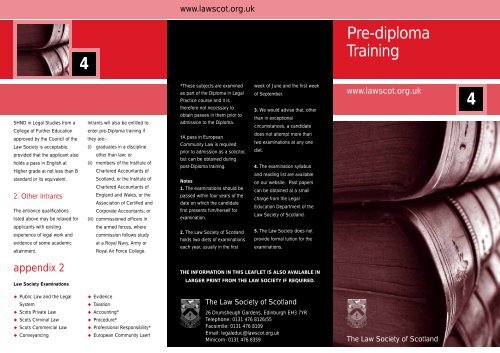
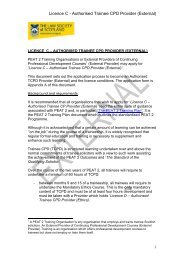
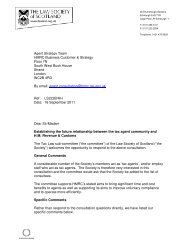
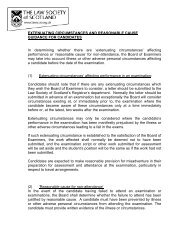
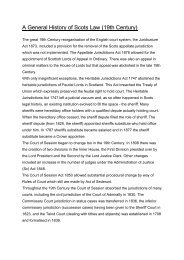
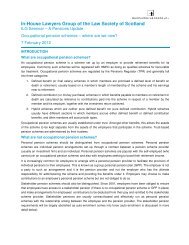
![BMA Consent form[1]. - Law Society of Scotland](https://img.yumpu.com/48530616/1/184x260/bma-consent-form1-law-society-of-scotland.jpg?quality=85)
